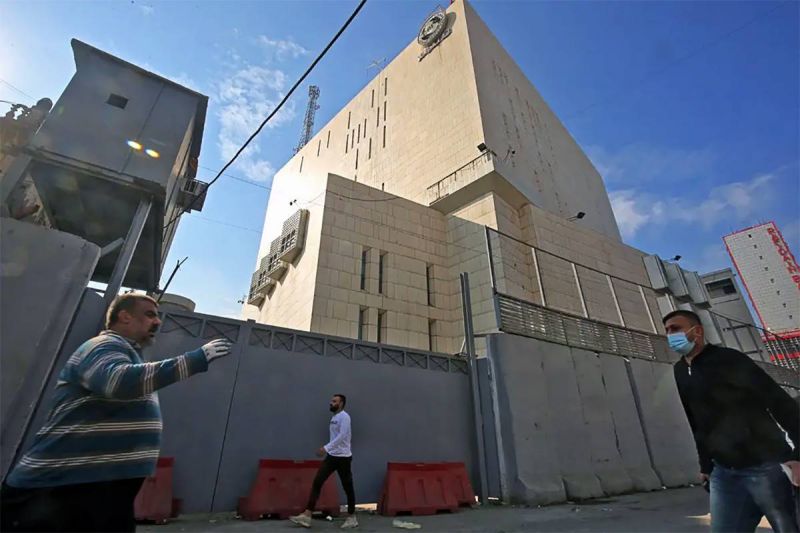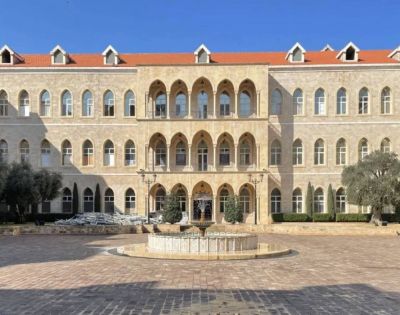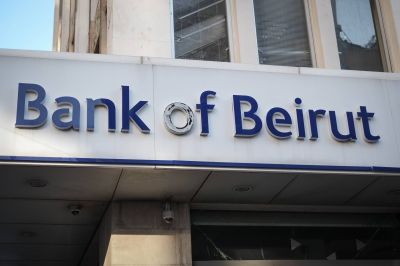
Iraq's central bank headquarters in Baghdad. (Credit: AFP/File photo)
If regional media are to be believed, the last few weeks have been full of promises of a bright future for the Iraqi economy, with the Gulf States playing the role of generous sponsors.
On the one hand, three Qatari companies agreed with the National Investment Commission of Iraq to work on 9.5 billion worth of projects, including the construction of two power stations totaling 2,400 megawatts.
At the beginning of the same month, Saudi Arabia signed a 1 $billion agreement to build a residential and commercial district in the Iraqi capital, and in May it set up a Saudi-Iraqi investment fund with a capital of $3 billion.
The situation, which comes in the wake of the détente between Saudi Arabia and Iran, on the one hand, and the normalization taking shape between the Gulf Cooperation Council and Israel, on the other, is being closely watched by the last Lebanese banks that are still operating in Iraq. They hope that they would benefit from the momentum that is being shaped.
“The situation in Iraq has improved a lot recently. The country is benefiting from the efforts of the GCC, Saudi Arabia in particular, to stabilize and develop the region,” said Chawki Badr, assistant director of Bank of Beirut and the Arab Countries (BBAC)
“This is good news for Lebanese banks, which have been able to maintain their presence despite the difficulties,” he added, suggesting that they can now hope to see their tenacity rewarded.
The World Bank already foresaw in its latest Iraq Economic Monitor, published in the fall, that the Iraqi GDP is projected to grow by four percent in 2023, following a rise to 8.7 percent [in 2022], driven by world oil prices, which are higher compared to pre-COVID-19.
More than two and a half to go
Founded in the 1950s, BBAC is one of the three Lebanese banks to have continued to operate in Iraq. The bank has three branches in Baghdad, Erbil and Sulaymaniyah. Only Byblos Bank, which operates in the same cities, and in Basra, is as well established, while the Middle East Africa Bank now only has its head office in the capital.
The Management at Byblos Bank was not available for comment.
MEAB’s head office in Beirut told L’Orient-Le Jour that it will continue to operate as usual in Iraq. However, within the Lebanese banking sector, some claim that the bank is also about to leave the Iraqi market, while others claim that it has been placed under the Central Bank of Iraq (CBI)’s supervisory authority.
L’Orient-Le Jour has seen a copy of a document signed by the CBI. It notified the MEAB that it will be placed under supervision in Iraq on Aug. 17 2022.
The other Lebanese banks present in the country — Bank Audi, Bankmed, BLOM Bank, BLF, Crédit Libanais, Fransabank and IBL Bank — all left the country one after the other over the past five years.
None of these banks was willing to answer our questions for the time being.
“The situation was no longer bearable for many banks, either because of the difficulties linked to the crisis in Lebanon or because of the obstacles placed in their way by the CBI,” a director at one of these banks, who asked that neither he nor the bank he works at be named, told L’Orient-Le Jour.
In his view, the departure of a majority of Lebanese banks from the Iraqi market has less to do with the difficulties emanating from Lebanon’s financial crisis of 2019 than with a key decision taken by the CBI just before the situation degenerated in Beirut.
“The CBI suddenly decided one day that every foreign bank operating in Iraq is required to have assets worth at least 250 billion Iraqi dinars [around $190 million at the current exchange rate]. This amount is equal to the capital that any Iraqi bank approved by the institution must have built up,” said BBAC’s Badr.
The Lebanese banks that remained there were the only ones able to meet these requirements.
Difficult return
Despite its potential, the Iraqi market has often been difficult for foreign banks operating there. The country experienced a long period of insecurity and chronic internal conflict between the fall of Saddam Hussein in 2003 and the current relative calm, crystallized through the agreement on oil management signed in April between Baghdad and Iraqi Kurdistan.
On the sidelines of these tensions, which have been punctuated by periods of bloodshed and dominated by endemic corruption, Lebanese banks have also seen some of their funds frozen before being returned — with a 25 percent deduction in the process — by the Central Bank of Erbil between 2015 and 2020, against the backdrop of a dispute between this institution and the CBI.
This combination of factors, in a sector dominated by state banks, has contributed to an exodus of Lebanese banks. For many of them, it is undoubtedly too late to consider a return in order to find a place to take advantage of the investments that the Gulf economies are planning to make in the country.
“Given the serious financial situation in which Lebanon finds itself, Lebanese banks have no room for maneuver to mobilize money to embark on an adventure abroad. They rather tend to repatriate funds from the sale of foreign assets in order to meet the challenges that lie ahead at the local level,” according to the bank executive.
The Lebanese banking sector is on the brink of a restructuring that could leave many banks by the wayside. The International Monetary Fund, from which Lebanon has been seeking assistance since 2020, is demanding that the sector absorb part of the losses, which exceed $70 billion, accumulated by the state, Banque du Liban and the financial institutions.
Against this backdrop, some of these banks have decided to completely separate the activities of their subsidiaries from those of their parent companies, so that the former are no longer exposed to the risks incurred by the latter.
In this context, it would not be surprising if the same treatment were imposed in the medium term on the subsidiaries of Lebanese banks still present in Iraq, so that they can take full advantage of the seemingly sunny days ahead.
This article was originally published in French in L'Orient-Le Jour. Translation by Joelle El Khoury.

